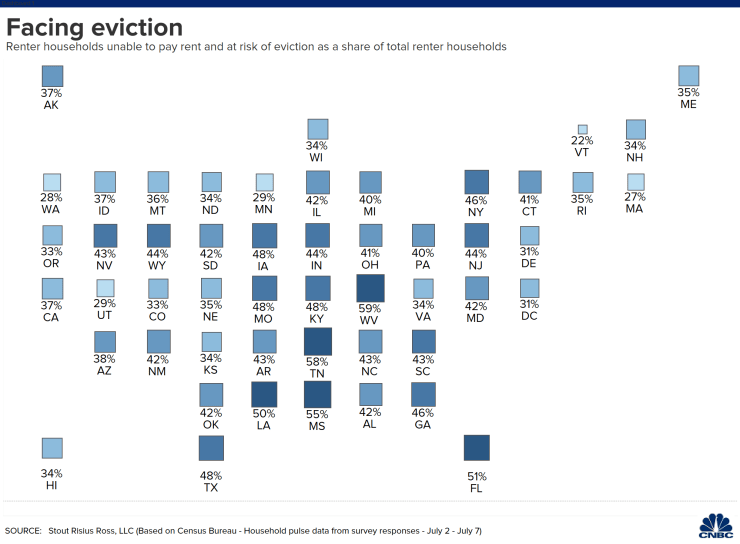The Daily Escape:

Sunset, Northern CO near WY border – 2020 photo by Maxwell_hau5_caffy. Note the beetle kill.
On Monday, the Republicans released their latest coronavirus stimulus package, the so-called HEALS Act. HEALS stands for Health, Economic Assistance, Liability Protection and Schools.
We know that it drastically reduces unemployment assistance, but it also doesn’t include an extension of the federal eviction moratorium. Last Friday, the federal moratorium on evictions in properties with federally backed mortgages and for tenants who receive government-assisted housing expired.
They should have called it the Republican HEELS Act.
Since Republicans want to cut the amount of federal enhanced unemployment insurance from $600/week to $200/week, it’s likely that many fewer Americans will be able to make their rent payments.
Housing advocates had been pushing for at least $100 billion in rental assistance, as well as a uniform, nationwide eviction moratorium. According to the COVID-19 Eviction Defense Project, we may be looking at something like 19 to 23 million, or 1 in 5 people living in renter households could be at risk of eviction by October.
But that may be optimistic. CNBC published this map of potential evictions by state, based on an analysis by global advisory firm Stout Sirius Ross. It shows the percentage of renters in each state that could face eviction:

For example, 59% of renters in West Virginia (highest) are at risk of eviction, compared to 22% in Vermont (lowest).
The average number for the US is about 43% of tenants are at risk of eviction. That equates to 17.6 million households. The study estimates that there will be 11.9 million eviction filings in the next four months. They think that there will be two million evictions filed in both August and September, leaving 8 million for October and November.
Let’s have a thought experiment. The study assumes that there will be two million evictions filed in both August and September, and another four million in each of the following two months. Let’s stipulate that each household averages 2.5 humans.
August: 2 million evictions equals 5 million homeless
September: 2 million evictions equals 5 million homeless
October: 4 million evictions equals 10 million more homeless
That totals 20 million people who are casting about for shelter as the cold weather hits the US, with another 10 million to come in November, for 30 million total.
This is an apocalypse.
An important consideration is that perhaps as many as 7 million of them may be registered voters who will be disenfranchised in November, since they no longer live at the address where they are registered.
Think about what’s coming from this change to the Republican bill: Millions of people will be realizing that they have absolutely nothing left to lose, people who feel as though there’s no way out. Then they find they are suddenly ineligible to vote.
2020 has forced our eyes open. All generations that are younger than the Boomers already feel as though any opportunity they had for a sound future has been stolen. In the midst of a global pandemic, they’ve seen Washington deny them healthcare, a safety net, and fritter away most of the societal stability they had.
So where are we heading?
If evictions occur on a grand scale, we’ll be in uncharted waters. It’s not just people being thrown out on the street, there’s no one else moving in. Residential landlords with no tenants face a dilemma, the same situation that has already affected commercial landlords: Few tenants and those who remain are looking for lower rents. When residential properties in the cities become vacant because of eviction or other reasons, and nobody is around to move in, what happens?
Squatting is likely. Carving residences into smaller and smaller units was common during the Depression, and that’s likely to happen again. Our biggest problem is that there is no obvious way to get America off the current Road to Ruin. DC is a disaster on all fronts.
Once the pandemic emergency is past, we will understand the extent to which the rich and politically well-connected have been taken care of, while the poor have largely been destroyed.
We’ve learned beyond a shadow of a doubt how political action, including $multi-trillion bailouts can be mobilized quickly for the right class of people, while helping the rest of us can be dismissed out of hand.
Same old story in America.
What can/should Biden do to change this?

Much of Europe did the simple thing – pay the workers directly, and do a hard shutdown. That worked. We instead did something horribly complicated to avoid paying workers, that unfortunately helped few. Oddly, I am still working at age 69 and though my income would exclude me from the Covid bonus, as a couple, wife and I get a reduced one. All so stupid really. I did not need it, while those who do get so little.
My advice to people who receive the $1200 and don’t need it, is to donate the $$ to worthy downballot candidates in close election contests. My focus is on flipping the Senate.